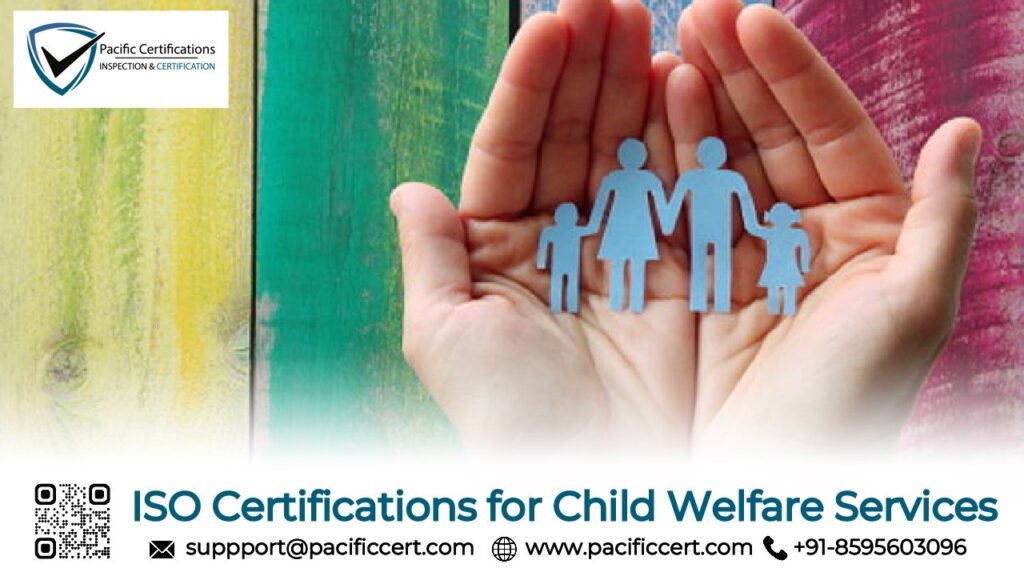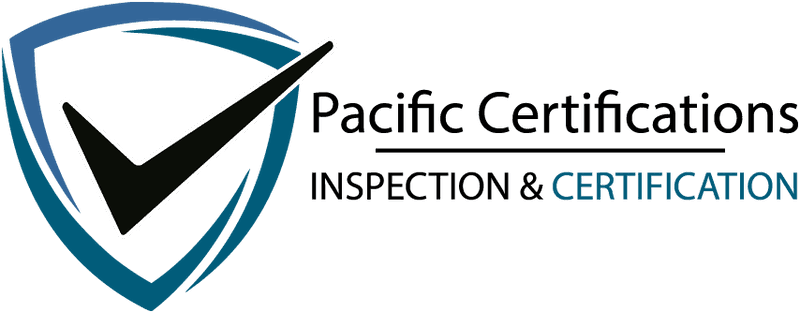
ISO Certifications for Child Welfare Services, Requirements and Benefits
Ensuring the safety, well-being & development of children is a priority for organizations that provide child welfare services. With growing concerns over quality assurance and compliance, many institutions are turning to internationally recognized standards like ISO certifications.
International Organization for Standardization develops global standards that help organizations to increase service delivery and maintain operational excellence. For child welfare services, implementing ISO standards demonstrates a commitment to providing a structured and high-quality service environment.

ISO certifications not only instill trust among stakeholders but also ensure compliance with regulatory requirements. Whether a non-profit organization or private institution, obtaining ISO certification can significantly enhance efficiency while reinforcing child protection policies.
Send your inquiries to support@pacificcert.com and our team will assist you with the certification process.
Applicable ISO Standards for Child Welfare Services
Several ISO standards apply to child welfare services, ensuring safety, quality, and ethical practices. Here are the most relevant ones:
- ISO 9001:2015 – Quality Management System (QMS): ISO 9001 sets the foundation for a robust Quality Management System (QMS), ensuring child welfare organizations operate with well-defined procedures, continual improvement, and customer satisfaction. Compliance with this standard helps institutions streamline processes, enhance service quality, and maintain effective governance.
- ISO 45001:2018 – Occupational Health and Safety (OH&S) Management System: Organizations providing child welfare services must safeguard employees, caregivers, and children under their care. ISO 45001 ensures a safe and healthy working environment, reducing risks of injuries and workplace hazards.
- ISO 27001:2022 – Information Security Management System (ISMS): Child welfare organizations handle sensitive personal data. ISO 27001 helps protect such information by implementing a systematic approach to managing and securing sensitive data against breaches, cyber threats, and unauthorized access.
- ISO 26000:2010 – Social Responsibility: While not certifiable, ISO 26000 provides valuable guidelines for ethical and socially responsible operations. It helps organizations align their policies with child rights, ethical treatment, and sustainable service delivery.
- ISO 31000:2018 – Risk Management: Managing risks in child welfare services is crucial. ISO 31000 provides a framework to assess, mitigate, and control risks associated with child protection, operational failures, and unforeseen incidents.
- ISO 10002:2018 – Customer Satisfaction and Complaints Handling: Child welfare services often involve complex stakeholder interactions, including children, parents, caregivers, and government agencies. ISO 10002 helps organizations handle complaints efficiently, ensuring grievances are addressed systematically.
- ISO 14001:2015 – Environmental Management System (EMS): Many child welfare organizations operate facilities such as shelters, care homes, or educational centers. ISO 14001 ensures sustainability and environmental responsibility by reducing waste, energy consumption, and ecological impact.
Click here to find out more applicable standards to your industry
At Pacific Certifications, we specialize in ISO audits and certification issuance for child welfare organizations. Our experienced auditors assess your compliance with the required standards and provide certification upon successful completion of the audit.
We offer certification services for:
- ISO 9001 (Quality Management)
- ISO 45001 (Health & Safety)
- ISO 27001 (Information Security)
- ISO 14001 (Environmental Management)
- ISO 31000 (Risk Management)
- Other applicable ISO standards
Our certification process ensures transparency, efficiency, and credibility, helping child welfare services align with best practices and regulatory requirements.
Follow Pacific Certifications on LinkedIn for updates, industry insights, and ISO certification trends. For direct inquiries, reach out via support@pacificcert.com.
Requirements of ISO Certifications for Child Welfare Services

Each ISO standard has specific requirements that organizations must fulfill for certification. Below is a breakdown of key requirements for each applicable standard:
ISO 9001:2015 – Quality Management System (QMS)
- Establish a Quality Management System (QMS) with documented policies and procedures.
- Define quality objectives to enhance service delivery.
- Implement a system for performance evaluation and continuous improvement.
- Conduct internal audits and management reviews regularly.
ISO 45001:2018 – Occupational Health & Safety (OH&S) Management
- Identify and assess workplace hazards for employees and children.
- Implement preventive and protective measures to reduce risks.
- Ensure staff training on health and safety policies.
- Conduct regular risk assessments and emergency preparedness drills.
ISO 27001:2022 – Information Security Management System (ISMS)
- Identify sensitive data (children’s records, employee details, case files).
- Implement data protection measures and access controls.
- Conduct regular risk assessments to prevent security breaches.
- Establish an incident response plan for data breaches.
ISO 26000:2010 – Social Responsibility (Guidance Standard)
- Adopt ethical and responsible business practices.
- Ensure human rights and child protection policies are in place.
- Promote inclusive and fair treatment for all stakeholders.
- Engage in community development initiatives.
ISO 31000:2018 – Risk Management
- Identify potential risks (operational, financial, child safety).
- Develop a risk management framework with mitigation strategies.
- Conduct regular risk monitoring and assessments.
- Establish a crisis management and response plan.
ISO 10002:2018 – Customer Satisfaction & Complaint Handling
- Implement a structured complaint management system.
- Ensure timely resolution of complaints and feedback.
- Maintain transparency and documentation of all complaints.
- Continuously improve service quality based on feedback.
ISO 14001:2015 – Environmental Management System (EMS)
- Develop policies for waste management and sustainability.
- Monitor and reduce environmental impact (energy, water usage, pollution).
- Implement emergency response plans for environmental hazards.
- Ensure compliance with environmental laws and regulations.
By implementing these ISO standards, child welfare organizations can significantly improve safety and compliance, ensuring a secure and nurturing environment for children.
Need help with ISO certification audits? Pacific Certifications is here to assist!
Message us on +91-8595603096 via WhatsApp for quick assistance regarding ISO certification for Child Welfare Services, or email us anytime at support@pacificcert.com.
Benefits of ISO Certifications for Child Welfare Services

Child Safety & Protection: ISO standards ensure that child welfare organizations follow structured safety protocols, minimizing risks of abuse, negligence, or operational failures.
Service Quality: By implementing ISO-certified quality management systems, organizations can standardize their operations, ensuring better service delivery and stakeholder satisfaction.
Compliance: Certification helps child welfare services stay compliant with legal and regulatory requirements, reducing the risk of penalties and reputational damage.
Credibility & Trust: ISO-certified organizations gain trust from donors, government agencies, and the public, reinforcing their commitment to child welfare.
Risk Management: ISO 31000 and ISO 45001 help organizations identify, assess, and mitigate risks, ensuring operational stability and safety.
Resource Utilization: With ISO 14001 and other process improvement frameworks, child welfare organizations can optimize resources, reduce waste, and implement sustainable practices.
Privacy Protection: ISO 27001 safeguards sensitive data related to children, caregivers, and stakeholders, reducing risks of breaches and unauthorized access.
This year, child welfare organizations worldwide are increasingly focusing on digital transformation, cybersecurity, and enhanced safety protocols. According to industry research, over 60% of child welfare agencies are investing in ISO 27001 certification due to rising concerns about data security in digital case management systems.
Additionally, ISO 45001 compliance is becoming a priority as organizations strive to ensure staff safety amid increasing workplace hazards and mental health concerns. Governments and funding bodies are also emphasizing ISO certifications as a criterion for funding and grants, further driving the adoption of these standards.
Ensuring compliance with ISO standards can significantly elevate your child welfare organization’s credibility, safety, and operational excellence.
Pacific Certifications is here to assist you with audit and certification issuance for various ISO standards. Get in touch today to start your ISO certification journey!
Pacific Certifications is accredited by ABIS, in case you need support with ISO certification for your Child Welfare Services business, please contact us at support@pacificcert.com or +91-8595603096.
FAQs: ISO Certifications for Child Welfare Services
ISO certification ensures child safety, quality service delivery, regulatory compliance, and enhanced credibility, making organizations more trustworthy and efficient.
The certification process varies depending on the organization’s readiness, size, and complexity. On average, it can take 2-6 months after a successful audit.
While not legally mandatory, ISO certification significantly enhances an organization’s reputation, compliance, and operational efficiency.
Costs vary based on factors such as organization size, chosen ISO standard, and audit complexity. Contact Pacific Certifications for a customized quote.
ISO certifications are generally valid for three years, with annual surveillance audits required to maintain compliance.
Read More at: Blogs by Pacific Certifications






